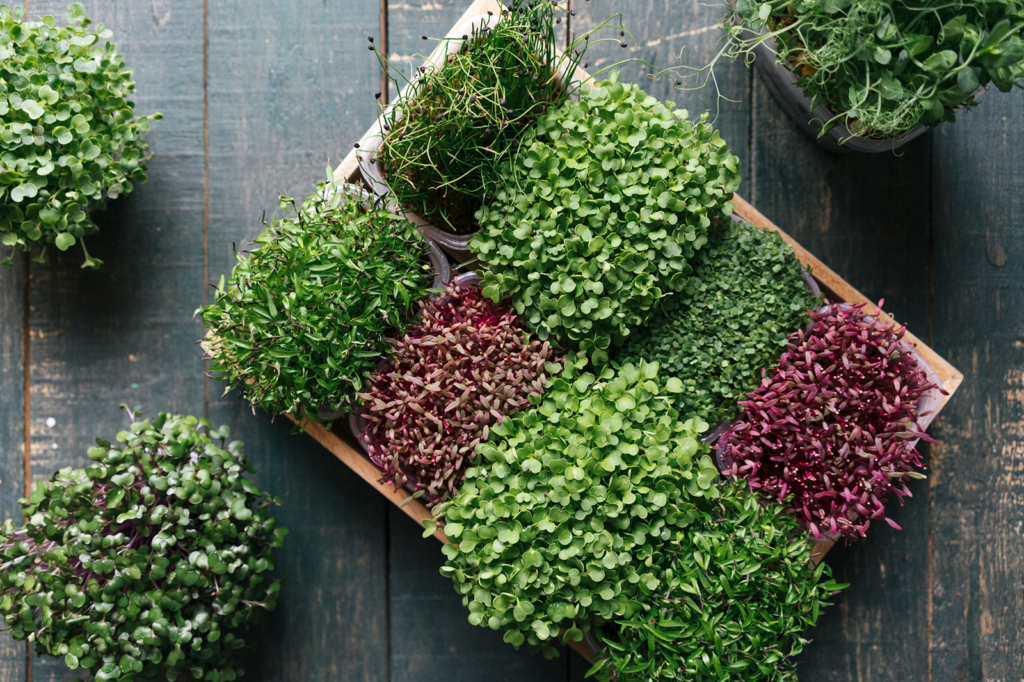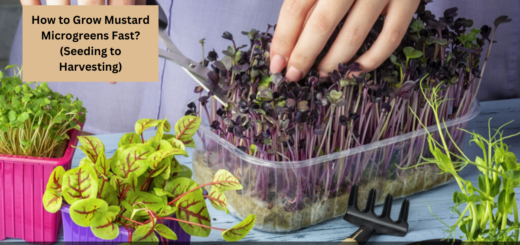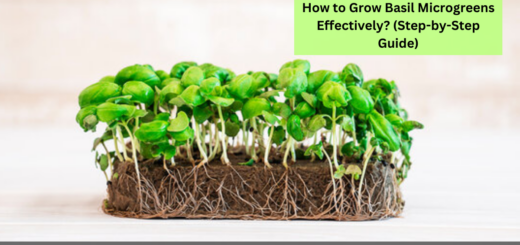12+ Health Benefits of Microgreens (Ways to Grow Them)
With my gardening experience, I have learned that bigger is not always better, especially when it comes to vegetables. When I discovered microgreens, I was surprised by their benefits and wondered why I hadn’t planted them sooner.
Setting aside my initial disappointment, I decided to grow microgreens, which come in various types and offer different health benefits.
To help you grow microgreens in your garden, I’ve outlined the reasons why they are beneficial, how to grow them, and the different types available. Let’s explore the world of microgreens!
Quick takeaways:
- Microgreens are considered young vegetables that can be harvested anywhere from one to three weeks after planting and at this time true leaves undergo photosynthesis.
- Avoid getting confused in microgreens with sprouts that provide a nutritional punch.
- The sprouts are harvested as newly grown seeds that arrive before leaves and bloom within a week or less. Avoid providing them with sunlight.
- The microgreens are older and need sunlight having an increased nutritional value.
- The microgreen leaves are used to capture energy from the sun and collect water in which the plant absorbs nutrients from the soil.
- Microgreens do have a big flavor which provides more concentrated nutrients when grown fully.
Health Benefits of Microgreens:
Well, talking about the benefits of eating microgreens depends upon the type of microgreens you are eating.
There is some research, which claims that a microgreen contains 4 to 40 times the nutrients of mature plant leaves.
Yes, vegetables do have high vitamins, but the minerals and phytochemicals in microgreens do have more nutritional value. There are many nutrients in the microgreens, which function as antioxidants having the power to prevent cell damage.
However, the microgreens are not only delicious and versatile, but they do have a powerful nutritional punch. So according to the research, here are some health benefits of microgreens.

Microgreens and Nutrition:
- The microgreen consists of essential vitamins and minerals, such as vitamins A, C, E, and K as well as they do have iron, calcium, and potassium.
- Some research claims that MicroGrade contains up to 4 times more nutrients when compared to the fully grown plant.
Microgreens and Antioxidants:
- Microgreens are high in antioxidants, which are beneficial for protecting the body against cell damage that is caused by free radicals.
- The antioxidants help reduce the risk of chronic diseases such as heart disease, cancer, and Alzheimer’s.
Microgreens and Inflammation:
- There are some saying that microgreens may have anti-inflammatory properties which help in reducing inflammation throughout the body.
- Chronic inflammation is linked with a wide range of health problems, such as arthritis, heart disease, and cancer.
Microgreens and Chronic Diseases:
- There are studies done, which explain that, due to high nutrient and antioxidant content, consuming micro greens helps in reducing the risk of chronic diseases, such as heart disease, cancer, and diabetes.
Microgreens and the Immune System:
- The microgreens do have high levels of vitamins and minerals, which is good for a healthy immune system.
- Many microgreens such as broccoli and reddish do have specific immune-boosting properties.
Microgreens and Digestion:
- The microgreens are also rich in fiber which is good for digestion.
- Eating fibers helps in moving the food through the digestive system and resulting in a healthy gut.
- It is considered a good source of enzymes, which help in breaking down food and absorption of nutrients.
- Eating microgreens helps improve digestion and prevent digestive problems, such as constipation and bloating.
Microgreens and a Healthy Gut:
- Microgreen consists of prebiotic fiber, which has beneficial bacteria feeding the gut.
- The bacteria present in microgreens play a vital role in maintaining a healthy gut and immune system.
- If you consume the microgreens regularly, it will help support the growth of these beneficial bacteria, hence resulting in improving gut health.
Microgreens and Weight Management:
- Yes, microgreens are low-calorie and high in nutrient plants, which is an excellent addition for people who are willing to weight loss or weight management plants.
- As they are rich in antioxidants, they help in reducing inflammation in the body and help improve overall health.
- By adding micro cream to the diet, you will feel full and satisfied rather than consuming fewer calories hence it makes it easier to achieve and maintain a healthy weight. Help manage Type 2 diabetes
Help in managing type 2 diabetes:
- The person dealing with type two diabetes cannot control the amount of sugar in the blood. In short, the cell. Do not remove the sugar from the body as they are supposed to.
- When they consume micro greens, it will help in regulating blood sugar.
- The research done on animals shows that broccoli microgreens help in improving insulin resistance. So sugar leaves the blood to enter the cell.
- Fenugreek microgreen is a legume that’s best in Indian cooking and improves cells taken in sugar by 25% to 44%.
Improve thinking and reasoning:
- Polyphenols are plant-based substances having antioxidant properties that provide several health benefits and in microgreen, there are a lot of them.
- There is scientific evidence showing that polyphenols improve how well you think and prevent or delay the beginning of neurodegenerative diseases like Alzheimer’s disease.
Lower the risk of heart disease:
- The polyphenols present in microgreens lower the risk of heart disease.
- The red cabbage microgreens can be added to a high-fat diet which helps to reduce body weight, triglycerides, and LDL cholesterol which all result in heart disease.
Prevent cancer:
- Brassicaceae microgreens contain sulforaphane which does have health benefits of cancer prevention.
- Adding Brassicaceae microgreen to a balanced diet helps to prevent, block, or reverse cancer growth.
- The microgreens are useful in preventing colon cancer.
Protect vision:
- Lutein is a powerful antioxidant that is found in spinach, broccoli, dandelion, and cress microgreens.
- They are beneficial for eye health in older adults.
- The lutein is used to improve or prevent age-related macular disease.
Reduce the risk of anemia:
- When a person suffers from iron deficiency, it can lead to the cause of Anemia.
- The lettuce and all the other Brassicaceae family-based vegetables are rich in iron.
- The fenugreek micro green does have the highest level of iron.

Types of microgreens:
The microgreens are a powerful pack of flavor, small size. The taste in them varies from sweet, spicy, or bitter which depends on the vegetables.
It is possible to grow microgreens from any herb or vegetable. Many people grow brains like oats and wheat or legumes as microgreens. Most of the tests of microgreen or the aftertaste are similar to the mature plant.
The following are some categories of microgreens, which are different plants based on families:
- Amaranthaceae: Amaranth, beet, and spinach.
- Amaryllidaceae: Garlic, leek and onion.
- Apiaceae: Carrot, celery, dill, and fennel.
- Asteraceae: Endive, chicory, lettuce and radicchio.
- Brassicaceae: Arugula, broccoli, cabbage, cauliflower, radish and watercress.
- Cucurbitaceae: Cucumber, melon, and squash.

How To Grow Microgreens:
The microgreens are similar to sprouts which are easy to grow at home in small amounts because it doesn’t take very long to grow and are possible to grow all year round on a windowsill or other sunny spot.
You can grow it by simply planting the seeds of the microgreens or sprouts that you want to have and ensuring to water them accordingly. Watch out for the guides and videos showing how to sprout or grow varieties of microgreens.
The microgreen is easy to grow and the best way to get your kids involved in growing their own food on a small scale. Yes, kids will enjoy sprinkling out little kid-sized leaves that can be used for their own salad or sandwiches. There are some microbes that have bolder flavor so be sure to 1st test before adding a whole handful of parts because a little also can go good.
as the microgreens are small and tender, which makes them easy to add to recipes, allowing you to take full advantage of their nutritional power. Because of their small size and high water content, it is not recommended to cook microgreens, but make sure to wash them before eating.
Tips for Consuming Microgreens:
The microgreens are considered easy to incorporate into meals and highly versatile. If you consume them raw they are most nutritious hence you can eat them without cooking them.
The following are some simple ways that will help you add microgreens to your diet:
- You can add them to sandwiches.
- Try adding mild-tasting microgreens for homemade smoothies.
- You can use them as a nutrient-dense topping to be used in soups, salads, and grain bowls.
- Microgreens can be used as a spicy garnish on avocado toast.
- You can use them by blending or puree them in homemade dips, pesto, and salad decorations.
- You can garnish hummus or other dips.
- Try mixing it into scrambled eggs or omelets.

Conclusion:
The microgreen is highly favorable and can be easily incorporated into the diet in different ways. They are very nutritious, which helps in reducing the risk of certain diseases as mentioned above. You can easily grow them at home, which is a cost-effective way of boosting nutrient intake without any purchase of large quantities of vegetables.


